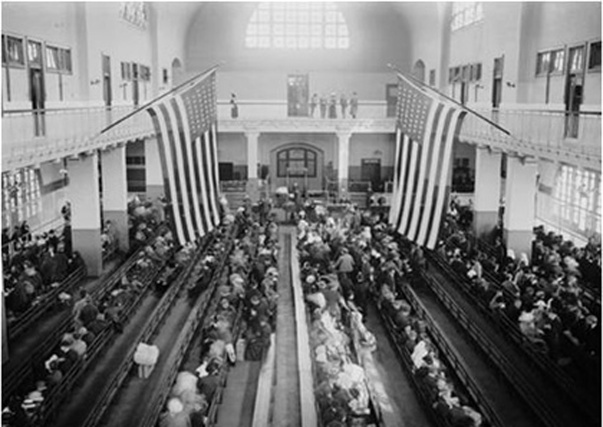[In 1913, Scottish travel writer Stephen Graham (1884-1975) left Liverpool, England, as a steerage passenger. This is another excerpt from his book, With Poor Immigrants to America (1914). In the previous installment [#16], he described events leading up to his inspection at Ellis Island. Here, he tells of his observations on the island itself.]
“Once more, it was Quick march! And—hurrying about with bags and baskets on our hands—we were put into lines. Then we slowly filed up to a doctor who turned our eyelids inside out with a metal instrument. Another doctor scanned faces and hands for skin diseases, and then we carried our ship-inspection cards to an official who stamped them. We passed into the vast hall of judgment, and were classified and put into lines again, this time according to our nationality. It was interesting to observe at the very threshold of the United States the mechanical obsession of the American people. This ranging and guiding and hurrying and sifting was like nothing so much as the screening of coal in a great breaker tower.
 Doctor examines immigrant’s eyelid.
Doctor examines immigrant’s eyelid.
It is not good to be like a hurrying, bumping, wandering piece of coal being mechanically guided to the sacks of its type and size, but such is the lot of the immigrant at Ellis Island.
But we had now reached a point in the examination when we could rest. In our new lines we were marched into stalls and were allowed to sit and look about us and, in comparative ease, await the pleasure of officials. The hall of judgment was crowned by two immense American flags. The center, and indeed the great body of the hall, was filled with immigrants in their stalls, a long series of classified third-class men and women. The walls of the hall were booking-offices, bank counters, inspectors’ tables, stools of statisticians. Up above was a visitors’ gallery where journalists and the curious might promenade and talk about the melting pot and America, “the refuge of the oppressed.” Down below, among the clerks’ offices, were exits; one gate led to Freedom and New York, another to quarantine, a third to the railway ferry, a fourth to the hospital and dining room, to the place where unsuitable emigrants were imprisoned until there is a ship to take them back to their native land.
Somewhere also there was a place where marriages were solemnized. Engaged couples were there made man and wife before landing in New York. I was helping a girl who struggled with a huge basket and a detective asked me if she were my sweetheart. If I could have said, “Yes,” as like as not we’d have been married off before we landed. America is extremely solicitous about the welfare of women, especially of poor unmarried women who come to her shores. So many women fall into the clutches of evil directly they land in the New World. The authorities generally refuse to admit a poor, friendless girl, though there is a great demand for female labor all over the United States, and it is easy to get a place and earn an honest living.
It was a pathetic sight to see the doubtful men and women pass into the chamber where examination is prolonged, pathetic also to see the Russians and Poles empty their purses, exhibiting to men with good clothes and lasting “jobs” all the money they had in the world.
At half-past two, I gave particulars of myself and showed the coin I had, and was passed.
Have you ever been arrested? asked the inspector.
Well, yes, I had. I was not predisposed to lie. I had been arrested four or five times. In Russia you can’t escape that.
For a crime involving moral turpitude? he went on.
No, no.
Have you a job in America? (This is a dangerous question; if you say yes, you probably get sent back home; it is against American law to contract for foreign labor.)
I explained that I was a tramp.
This did not at all please the inspector. He would not accept that definition of my occupation, so he put me down as author.
Are you an anarchist?
Are you willing to live in subordination to the laws of the United States?
Are you a polygamist?
What does that mean? I asked.
Do you believe a man may possess more than one wife at a time?
Certainly not.
Have you any friends in New York?
Acquaintances, yes.
Give me the address.
I gave him an address.
How much money have you got? . . . Show it to me, please. . . . And so on. I was let go.
At three in the afternoon I stood in another ferry boat, and with a crowd of approved immigrants passed to the City of New York. Success had melted most of us and, though we were terribly hungry, we had words and confidences for one another on the ferry boat. We were ready to help one another to any extent in our power. That is what it feels like to have passed the Last Day and still believe in Heaven, to pass Ellis Island and still believe in America.
[If you liked this story, you will enjoy my historical novel, Guardians of the Gate and its sequel Defenders of Freedom, inspired by actual people and events. Both are about immigrants to Ellis Island and the romance and corruption among its staff.]
